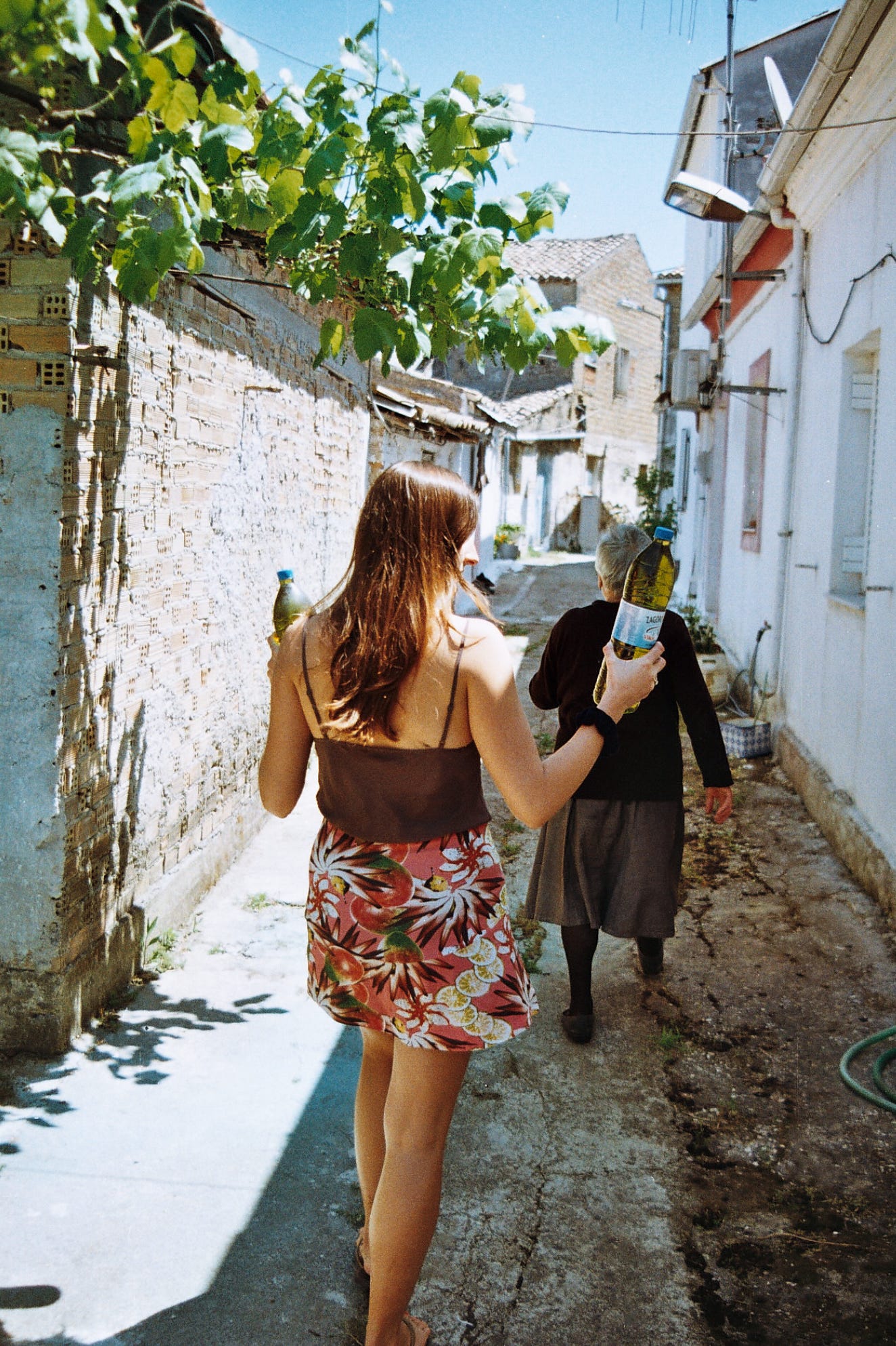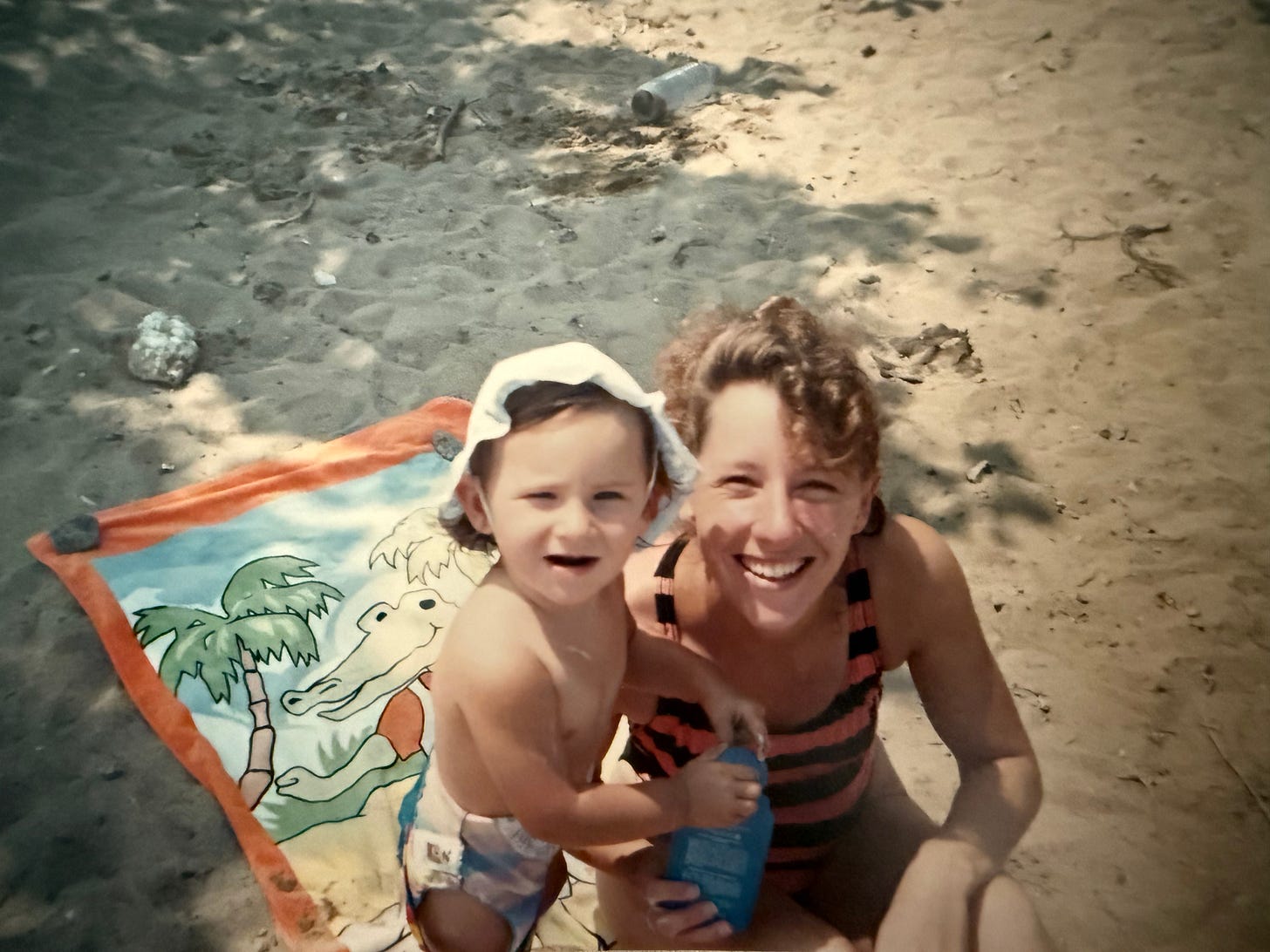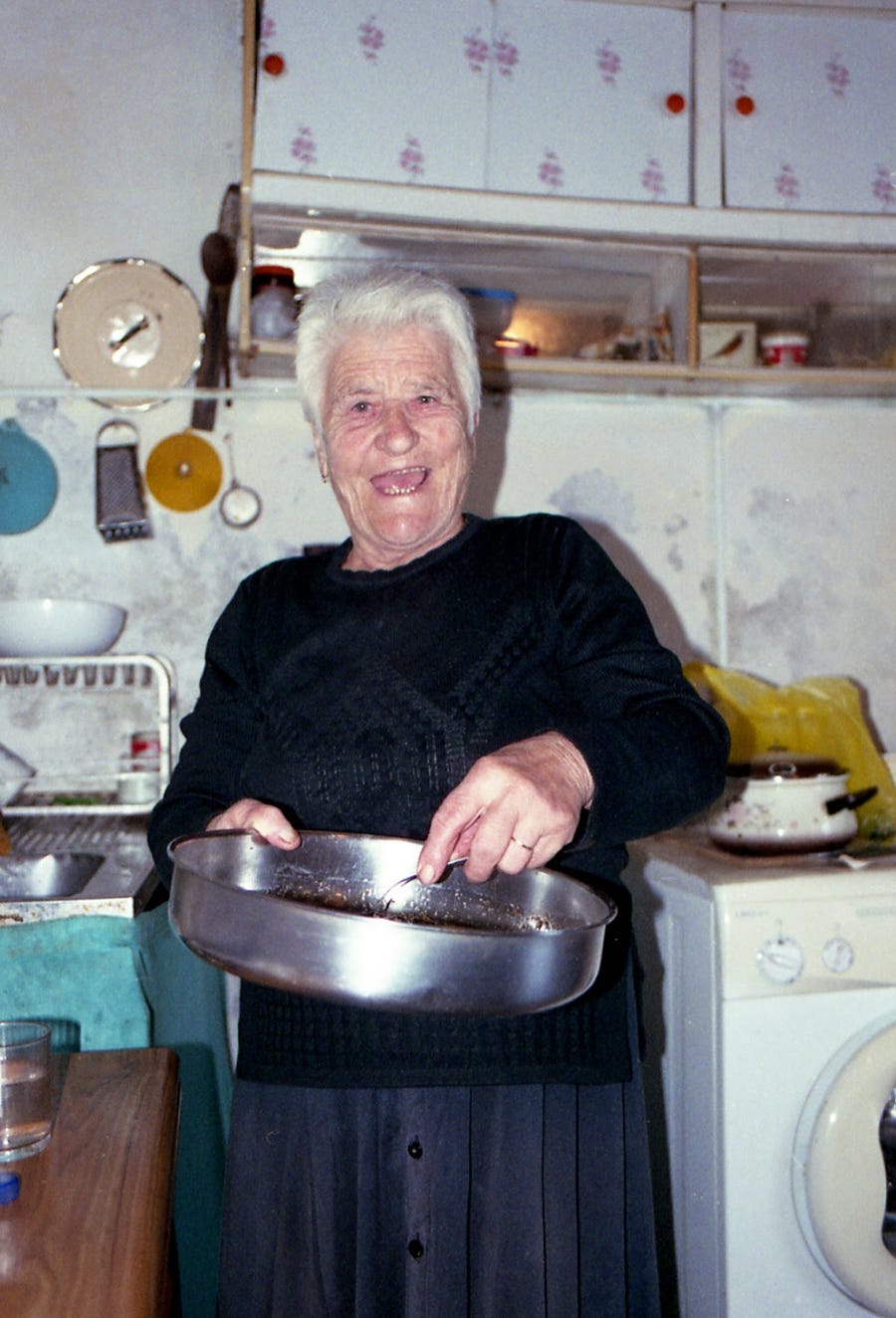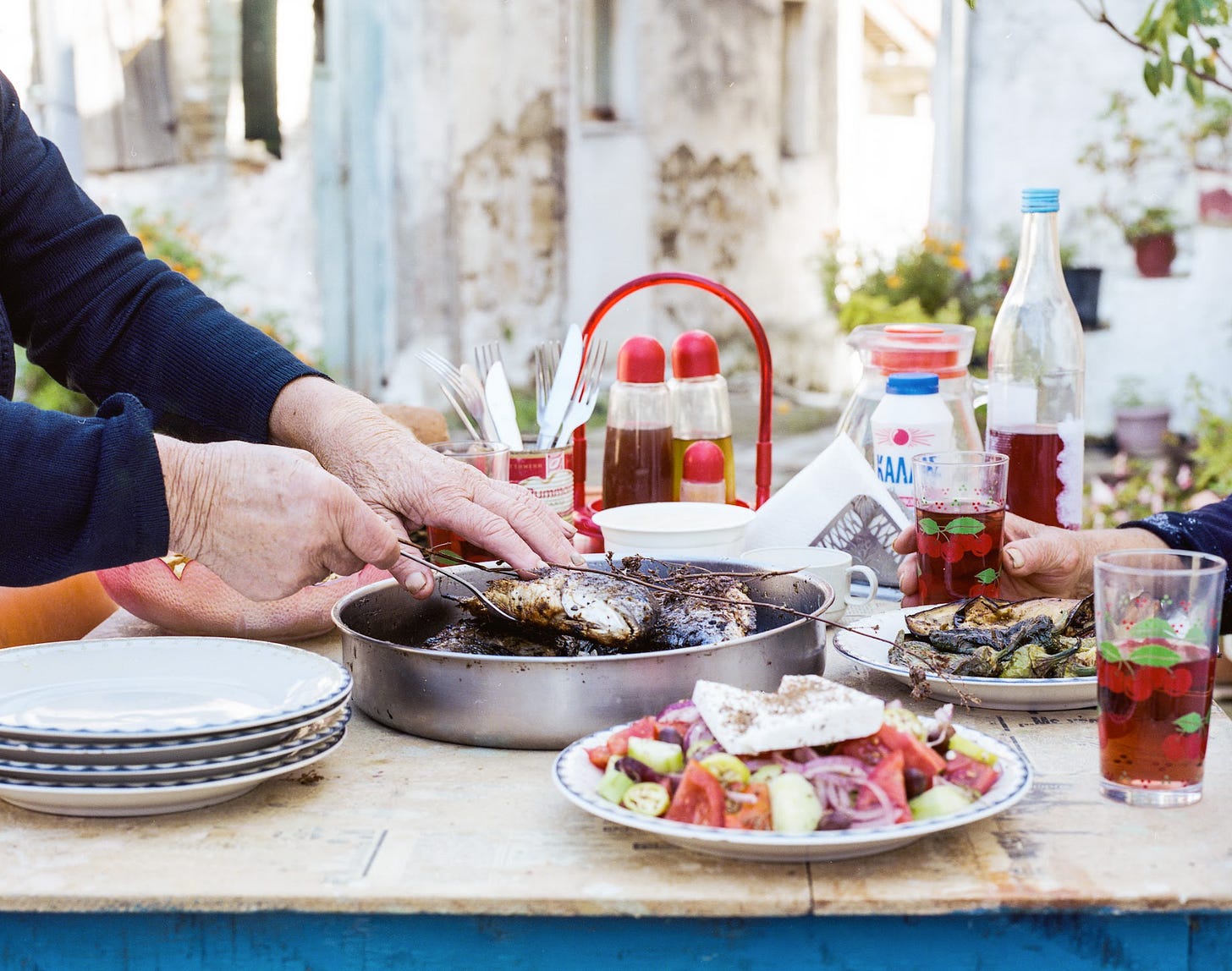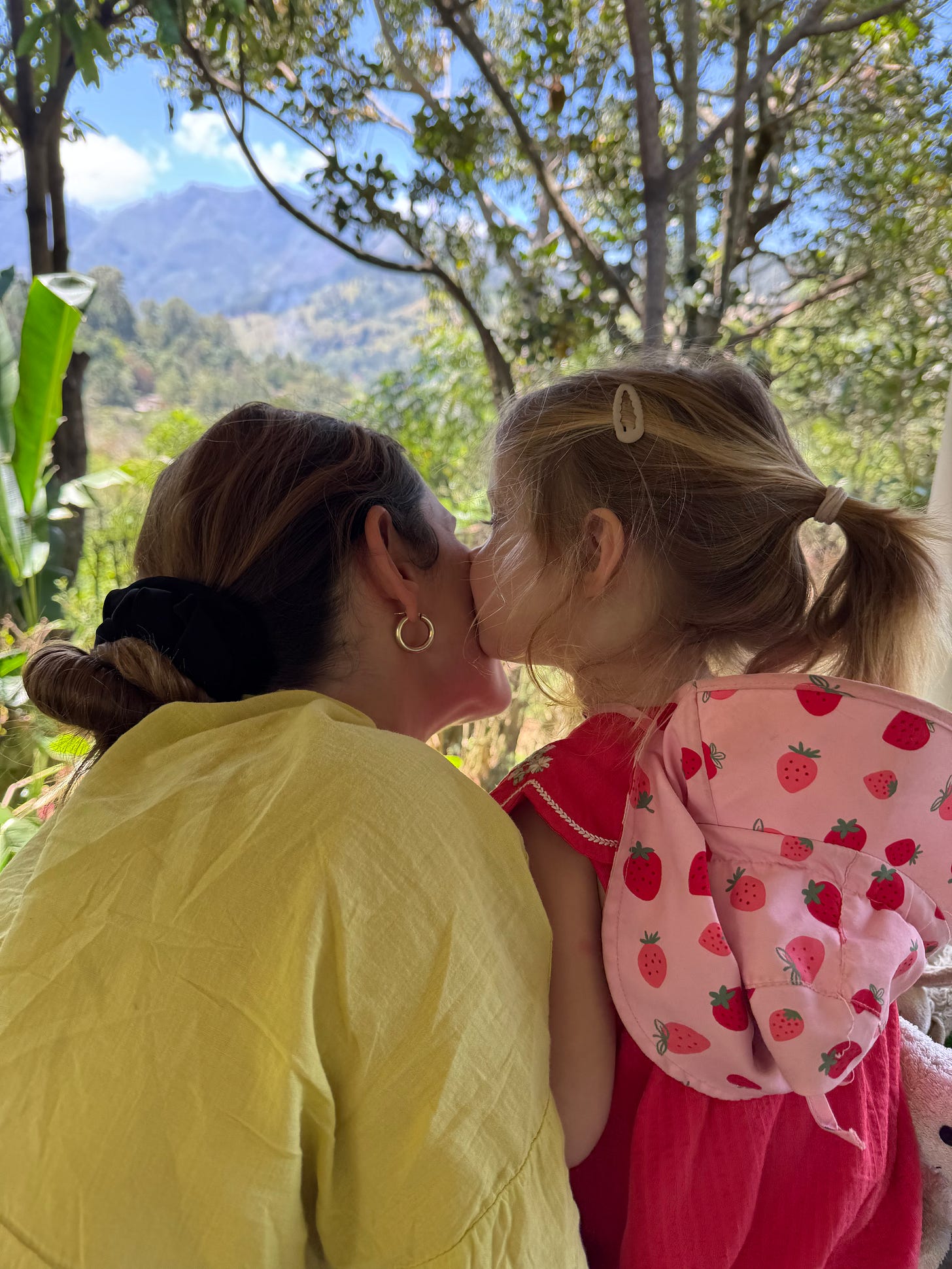Searching for a substitute mother in the world's grandmothers.
My mother's depression left a mark: why I really do what I do
Hi all,
There are so many of you new here (thank you very much for subscribing and supporting!) that I think it may be time to share the personal reasons behind my decade-long journey around the world to cook with grandmothers and my move from London back home to Greece. If you like what I do, please do consider sharing this email with someone who might also relate!
Below, I’m sharing my Yiayia’s ultra comforting marinated seabream recipe with Greek fries (from my new book, Mediterranea), one I turn to when I feel in need of some familial TLC, but for now, here’s the intro to what I hope might be a coming food memoir…
MUMMY ISSUES
When I was six years old, my mum had a nervous breakdown brought on by post natal depression. What that looked like, from the haze of my distorted childhood memories, was my mother no longer being able to keep it together. One second she was doing the ironing and arguing with my dad. The next, she had thrown herself onto the floor and was convulsing. I can’t use an anthropomorphic metaphor here to describe her in that moment, because I had never seen an animal do what my mum was doing.
Her face was blotchy and red and the scrunchy in her hair had fallen out in the chaos of twitching limbs, punching at my mother’s face as if they didn’t belong to her. She growled and panted and kicked and jerked her body like she was at battle with an invisible force in the room. In the commotion, the iron - a relic of my Greek Yiayia’s from the 1960s - she’d been using on a pile of laundry had fallen off the ironing board and landed, hot at my feet on the varnished wooden floorboards. I was wearing sandals and my toes were centimetres away from a burning. Of everything that morning, I remember the heat coming off the iron most vividly. The faint scent of hot metal, slicing through my recollections.
We were in the cramped front room of the tiny village house we shared with my grandparents. I don’t know where my Yiayia or Pappou were at the time, nor my baby brother. Perhaps I have clung onto the key players of the memory and my brain has simply erased those who weren’t at the forefront of the action. It may well be that my one year old brother was there, screaming at the sight of mum, who no longer looked like our mum at all.
I was swiftly whisked away. Down the alley of whitewashed houses, all belonging to various members of my paternal family, cousins and aunties poking their heads out from beaded curtained doorways, as people are wont to do in villages. Scooped up and gripped in the vice of my father’s shaking arms, slung over his shoulder as I screamed and cried “Mamma, Mamma!”, looking back at our house, the uncanny sounds of my mother’s guttural wailing floating out after us past fragrant basil pots and feta vats filled with red geraniums. I kicked and writhed to free myself from his grip, to run back to mum and save her from whatever demon she was wrestling with. In a sense, I’ve been kicking and screaming to get the mother of my infancy back ever since.
Depression has clung to my mum since that initial breakdown, pulling her out of my reach in childhood and beyond my understanding as an adult. Bakc in the nineties in a Greek village on an island, she had little support in her mental health journey and this had a profound effect on her and our relationship. A yearning to be connected to the light, bright mother I knew before postnatal depression snatched her away from me has stayed with me for the rest of my life. I always envied the female friends around me who had great relationships with their mothers. My own was fractured and fraught with misunderstanding, my mum giving little away and preoccupied with her own haunting thoughts to be truly available to connect in the way I’ve longed for since childhood. It comes as no coincidence that I’ve now spent a decade of my adult life travelling the world to seek out time, wisdom and connection with elderly matriarchs.
When I embarked on my Matriarch Eats cooking with grannies project, I was twenty five, living in London and afloat in a sea of opportunities that I couldn’t ever quite grasp. The jobs I had dreamed of as a university student came and went, nothing ever quite sticking. The events production jobs wore me down. I wasn’t up for snorting coke and being fondled by the thirty-something founder of an immersive theatrical production group - a man child who only seemed to hire young girls in their twenties to work for him.
I didn’t particularly want to take the dangerous dog that the next boss at a ‘bold and radical’ fashion start-up off Old Street was fostering for a walk, a week after it had bit an intern in the face, leaving her with thirty stitches. Neither did I like the nickname ‘Starzles’, given to me by the Etonian (ditto on the man child) who’d founded his own experiential food agency and struggled so much with my northern twang that he asked I ‘upwardly converge’ to meet him at his RP English whilst helping him realise his dreams of sherbert fountains and lickable wallpaper in a dingy office basement with no natural light.
Temping as a writer at newspapers, magazines and at various fashion brands came next. Though I so desperately wanted to be like the friends around me that effortlessly slipped into careers and were seemingly clambering up the ladder to great success, I felt utterly uninspired and completely untethered. Treading water with an on again off again artist boyfriend that frequently said things like, “I can get a better looking girlfriend than you,” and, “your bum is so flat and wide, have you ever noticed it looks like an elephant’s?” I was both aware of how utterly lost I was and complicit in my interminable floating. The inflated rent for my one room needed to be paid and so the hamster wheel of London in my twenties rolled around and around, warehouse party after warehouse party, one hangover following the next.
Insomnia was a fact of my life, something I lived with for years like the moody French housemate I had to put up with. Anxiety about paying rent or my boyfriend cheating on me or how to construct a fountain that spewed sherbert on Oxford Street would grip me in the twilight hours while everyone slept and I would haunt the drafty rooms of my Edwardian terrace house with a hot water bottle, reading Shakespeare at three o’clock in the morning, hoping Hamlet might finally put an end to my misery and knock me out. I can talk of it lightly now from the comfort of my desk, in the house that I own, under the blue skies and bright sun of Athens but at the time, I was in a black hole. I could manage only two hours of sleep a night for a six month period. When my younger brother came to visit me, I told him I wanted to die.
My reprieve wasn’t the five-day bender festivals or drizzly weekends holed up in a pub or the breadcrumbing boyfriend. It was returning to my village home in Corfu, sleeping in my single bed with the itchy woollen blankets and waking to Yiayia gargling and noisily ridding herself of phlegm in the bathroom below my bedroom. Yiayia’s crisp sea bream, charred over an open flame in her kitchen outhouse was always the first meal that would greet me on my return. Punchy with garlic and lemon, she’d pair it with golden fries sizzled indulgently in her olive oil, then sprinkle both fish and chips with oregano and sea salt flakes. This dish (sharing a sneak peek of the recipe below!) will forever put a smile on my face and along with Yiayia, it’s the source of inspiration behind a decade of my work.
It was on one of my increasingly frequent ‘escapes’ from life in London to Corfu that I first began to follow Yiayia around the kitchen with a set of weighing scales and a measuring jug, insisting that she slow her entire process down, for the sake of me learning the recipes she’d perfected over a lifetime. I brought my friends Ella and Iska along for an off-season experience of the island, promising them an authentic insight into Greek village life. While we cajoled Yiayia into posing for photos while she cooked and insisted on shadowing her while she gutted fish with her favourite knife (blunt for as long as she has owned it but forever does the trick for her), I had no clue that the events of that long weekend with her could change the course of my life.
Ella and I had worked together on a fashion magazine. Beyond being a talented photographer, she works with a vintage Mamiya, large format camera which she brought along with her for the trip. Iska was working as a food stylist at the time. I had the idea that together, we could capture the dish that summed up my gutsy Yiayia in all its glory. That day, we captured the most beautiful image that has ever been taken of my grandmother. It’s a candid headshot in which every last wrinkle and wispy chin hair is noticeable. She’s half way through one of her famous cackles, blue eyes twinkling out of a ravined, expression lined face and her shock of thick hair is so white it blends in with the walls behind her.
I had set out to begin documenting my own Yiayia’s recipes but the morning we spent together in Yiayia’s cosy outhouse kitchen sparked another idea that has led to three published cookbooks and the following collection of experiences I felt it imperative to share with the world somehow.
As old Greek songs floated out from a paint-spattered radio, the grilled fish spiked with fennel seeds and garlic making me salivate, Yiayia began to tell us the story of how she met my Pappou. Yiayia had never imparted information about who she was before I had known her. She was a gutsy grandmother brought up in postwar Greece, living in abject poverty as a child at a time when some children on Greek islands died of starvation. She was one of the eldest daughters of ten children and had been expected to work in agriculture, mastering the art of swinging a hoe and slashing with a scythe at nine years old. Toughened by a difficult life, she isn’t a cutesy grandma that will sit and tell stories whilst embroidering or knitting. Yet that day, triggered perhaps by the dish that reminded me of her and my Pappou, she shared a piece of the puzzle of her life.
There’s something to be said for the power of the sense of smell. When we think about the senses, the olfactory is often overlooked but I can’t think of anything more evocative or triggering than the specific combination of spices in my Yiayia’s slow cooked beef pastitsada or the charred aromas of fish grilling over the flame of her outhouse fire.
Yiayia began to let me into her memories that day, nostalgia triggered by the scent of a dish she had cooked with my Pappou. I had never interviewed anyone whilst cooking before but suddenly the idea made a lot of sense. I have long used the subject of food to connect with people from far away places. The tuk tuk driver in Bangkok, a good-looking Argentine man I’d found myself sitting next to on a flight out of Salta to Buenos Aires, Peruvian ladies selling baby lambs at the market in Cusco; food was always the subject that could open up a conversation for me.
Since that day in the kitchen with Yiayia, I’ve used the subject of food and the act of preparing a meal as a tool to facilitate the sharing of memories. My project to write a book of my Yiayia’s recipes quickly gained momentum and became three cookbooks documenting the time-perfected recipes from grandmothers around the world.
It’s been almost a decade since I started. I have spent days - sometimes weekends - in the kitchens of over two hundred grandmothers, cooking up the flavours, memories and stories of their lives. For each grandmother I’ve cooked with, from Corfu to Cuba, Mexico to Moscow, I have picked up life lessons, anecdotes and wisdoms that have shaped my own trajectory. It’s no coincidence that a couple of years into this project, I left my London life behind and moved to the Mediterranean, eager to pursue quality of life over quantity of cash in my bank account. Beyond picking up recipes and refining my skills as a cook this past decade, I have been blessed with the knowledge - gleaned from over two hundred lifetimes - of what is needed for a healthy, happy and long life.
As an adult, I’ve tried very hard not to become like my own mother. It's a cliche but cliches are cliches for a reason, there’s a pinch of truth and relatability in them. The anxiety and insomnia that plagued me in London reminded me of the nights mum would wander the rooms of our semi detached house in the north of England, not healed from her breakdown, never to be cured of her mental trauma.
Anxiety and depression run in the maternal side of my family and I have learned from my experience in London, that I am not immune to either of these. It’s partly the reason I have sought out the wisdom of women who have lived full lives. I’m certain that anyone who has lived over eighty years has life lessons to share, either through their tried and tested successes or in the regret that sits with them over the choices they made, many years ago. They know what is needed for an enriched existence on this earth and they have a deep understanding of the fleeting quality of our time here. On a mission to juice every little last drop out of life, I have asked these women to impart their wisdom and show me how.
I have to admit that my work is also, in part, a way to assuage my growing climate anxiety. I do what I do for my daughter, Calypso, who will grow up in a time of unprecedented change and unpredictable conditions. I am well aware that by the time she is my age, she may not have a choice but to look to the stories and lessons in this book for guidance. We could all benefit from living life a little more like a Mediterranean Nonna, from their obsession with never letting anything go to waste to naps being observed as religiously as their church going. I think as the years propel us further into the century that will define our existence on this planet, we must all look back and take inspiration from the women that lived much more simply, frugally and happily before us, in order to move forwards.
What I collect is a pick and mix of moments in the kitchens and at the dining tables of grandmothers of the world. For centuries, women like my grandmother, their stories and their legacy have not been recorded. It’s really time that we listen up. We all know history was written by men but the future, in my opinion, should be informed by the lives of these women.
Pre order my latest book Mediterranea here - out July 31st, published by Penguin Random House.



